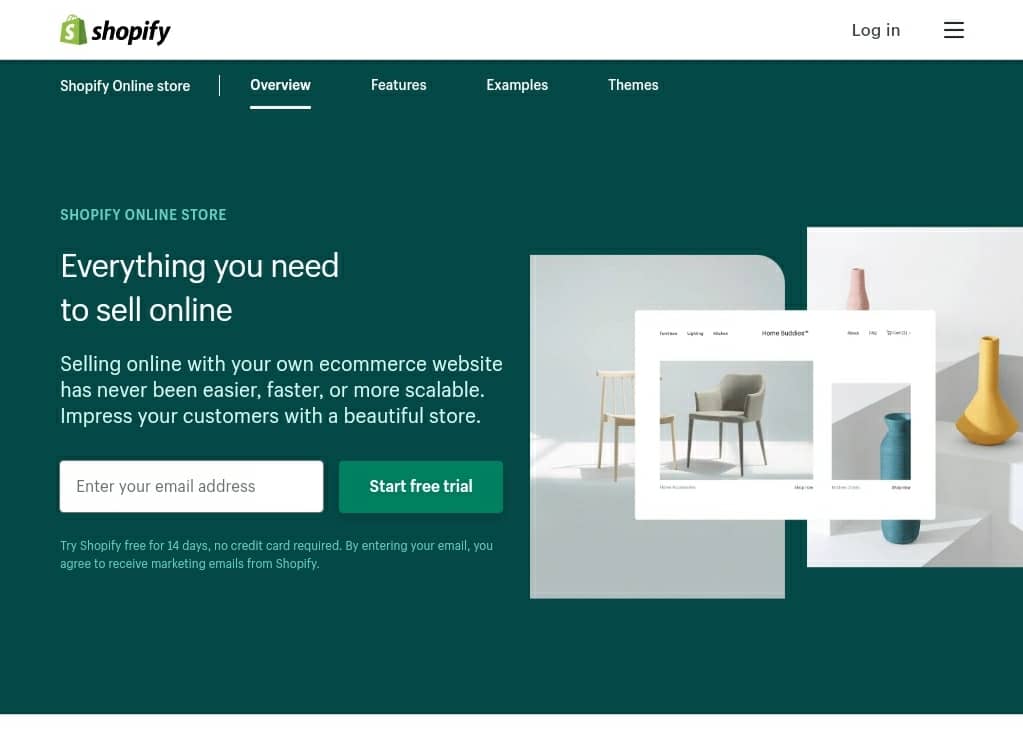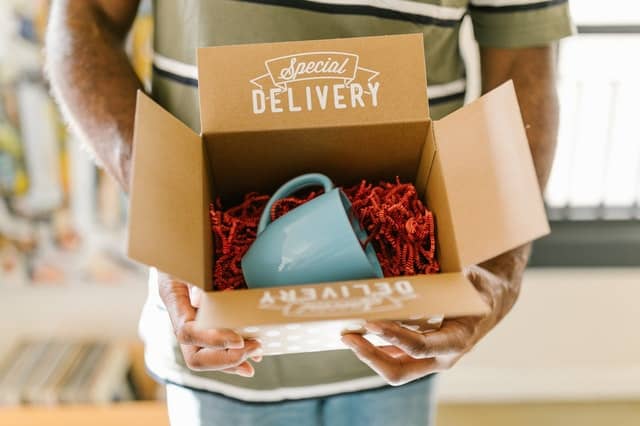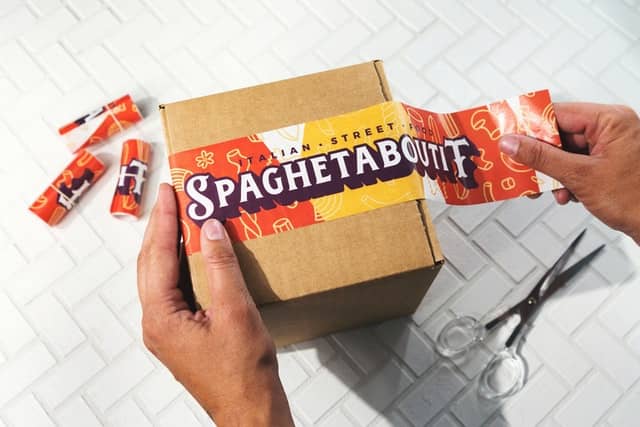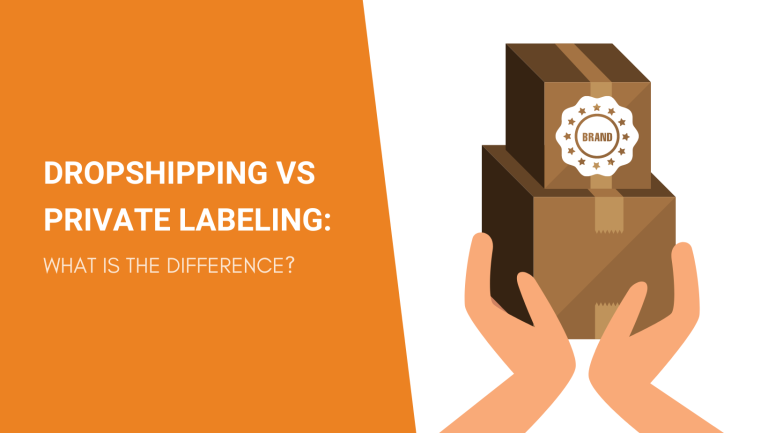Dropshipping is a promising business approach for anyone looking to start an online business. On the other hand, private labeling can work for both online and physical stores and is an ideal business model if you would like to grow your brand.
Nevertheless, while both of these concepts have great potential it is prudent to evaluate how they work and find out which of them aligns best with your budget and the plans you have for your business.
Lucky for you, you do not have to look much further for the answers you need. You can find them right here. Read on as we highlight what each concept entails, their pros and cons, and share tips on how to choose between dropshipping vs private labeling.

Dropshipping and Private Labeling Defined
Dropshipping is a business model where you run an online store and sell a selected niche of products. However, unlike a typical online store, dropshipping does not require you to handle any inventory or order fulfillment.
Instead, you would need to work with a dropshipping supplier. You would share the orders you receive in your store with them then they pack and ship them directly to customers.
In contrast, private labeling entails ordering custom goods from a supplier. They are called custom goods because they are manufactured based on a design or formulation that you have created and is unique to your brand.
Private label products are usually labeled using your brand’s logo and packaged in a style of your choosing. You can choose to sell them online or offline or even ask your manufacturer or a dropshipping service provider to handle fulfillment on your behalf.
Dropshipping 101
The first step towards establishing a dropshipping business would be to choose a niche of products that you would like to sell. You can then set up an online store on platforms such as Shopify, WooCommerce, or Wix.

Once the store is all set up, you can begin looking for dropshipping suppliers that you can work with. Aim for suppliers that offer quality products, efficient dropshipping fulfillment, and wholesale prices that allow you to make good profit margins.
It is also advisable to reach out to the dropshipping suppliers you choose to negotiate, and develop formal agreements with them. This could save you lots of headaches down the line. There is also no harm in having multiple dropshipping suppliers.
With the agreements in place, you can list the suppliers’ products in your online store and set retail prices for your customers.
How Does the Dropshipping Process Work?
After establishing your store, the dropshipping process works as follows:
- Market the goods listed in your store to your target market
- Receive orders from customers
- Share the orders with your dropshipping supplier
Note: You would pay the supplier a wholesale price and charge the customers in your store a marked-up retail price. The difference (wholesale price – retail price) would be your profit.
- The dropshipping supplier packs the products that each customer ordered and ships them directly to each customer

Dropshipping orders should be packed without any marketing material from the manufacturer/supplier. This prevents customers from abandoning your store and buying directly from suppliers.
It is one of the reasons why it is so important to have agreements with your dropshipping supplier.
However, if you encounter a supplier that is not willing to offer blind dropshipping or does it at too high a cost, you could always contract a dropshipping agent. The agent would collect the products from the supplier, repackage them, and fulfill orders.
Pros and Cons of Dropshipping
Pros:
- Low start-up costs- the start-up costs to establish or run a dropshipping business are low. This makes it a more accessible business model for most entrepreneurs.
- Flexibility – It is easy to grow and diversify the products or scale of a dropshipping store. More so because you do not hold any physical inventory that you need to sell off before expanding or introducing new products.
- Ease- Running a dropshipping store does not require any advanced business skills. You can learn on the job and even automate most systems.
- Low risk – Dropshipping does not require you to buy any inventory or invest huge sums of money. You are, therefore, exposed to a very minimal risk of making losses.
Cons:
- Challenges with suppliers – sometimes the quality of goods that suppliers send out can be below par. This can negatively affect the reputation of your business and even result in losses if you have to reimburse customers.
- Intense competition – it is a good thing that the dropshipping model is so easily accessible. However, on the flip side, this has also made the dropshipping sector very competitive as many more entrepreneurs try their hand at it.
- Lack of a brand identity- in the dropshipping model, you only sell products from other suppliers. They typically do not bear your brand logo. This could make it difficult for you to establish long-term brand loyalty among your customers.
Private Labeling 101
Private labeling allows you to design or formulate products specifically for your brand. It solves the problem of low customer loyalty that you may experience with unbranded dropshipping products.
How Does Private Labeling Work?
Take, for instance, that you would like to manufacture private label jewelry. The first step would be to come up with a few basics on the kind of jewelry you would like to make for your brand. Such basics could include:
- The materials you would like the jewelry to be made of
- Whether or not you would like to use precious stones
- Mockups, sketches, or a theme for the jewelry line
- Jewelry packaging preferences

These factors will give you a clear idea of the kind of private label jewelry manufacturers that you should find. You can then start looking for manufacturers online, at jewelry fairs and exhibitions, or you could hire a sourcing agent to find one for you.
Once you identify a suitable jewelry manufacturer, the process would proceed as follows:
- Share the design with the manufacturer
- The manufacturer evaluates the design and gives feedback on whether it is ideal for manufacturing. They may suggest changes to help perfect your designs.
- The manufacturer produces samples of your jewelry designs for your approval.
- If the jewelry samples meet your standards, you can enter a formal agreement with the manufacturer and place an order for the first batch of jewelry.
- The jewelry can be delivered to you to sell through a traditional online store or a physical outlet. You can also choose to sell it via dropshipping.
Part of the agreements you establish, with any manufacturer that you deal with, should be a Non-disclosure Agreement (NDA) or a Non-disclosure, Non-use, Non-circumvention Agreement if you are working with a manufacturer in China.
These agreements will ensure that your manufacturer can not use your designs to make jewelry and sell it as their own. They are important because they uphold the integrity of private labeling which is to develop products that are exclusive to your brand.
Pros and Cons of Private Labeling
Pros:
- Brand identity- creating, marketing, and selling your own line of products could boost the identity and prominence of your brand far more than selling other suppliers’ products.
- Multiple retail options- private labeling does not restrict you to selling online. You can sell your products through any channel(s) that you prefer or find more accessible to your customers.
- Quality control- in private labeling, you design or formulate the products that you sell. This enables you to control the quality of the products that you offer to your customers.
- Better profit margins – private label products are unique to your brand and thus you do not have to conform to the prevailing prices in the market. You can set more lucrative prices than if you were selling other suppliers’ products.
Cons:
- It requires advanced skill- private labeling requires you to have an in-depth understanding of the products you are dealing in. This is the only way you would be able to design your own unique line of products.
- High costs- developing a product requires a substantial capital investment because you may need to hire professional designers, pay for research, and prototypes.
- High risk- when you order private label products, the only way to recover your money is to sell the products. This is risky because, unlike dropshipping, you own the inventory and could make losses if it does not sell.
- It is a time-consuming process- product development often takes multiple trials and tests. This is then followed by the manufacturing stage and other supply logistics. All this makes private labeling a rather lengthy process.
Key Differences: Dropshipping vs Private Label
As you weigh your options on whether to choose dropshipping or private labeling, here are some key factors worth keeping in mind.
Start-up Costs

If you have a limited budget, dropshipping may be an easier route to take than private labeling. It requires little funding and you can even start small and expand or automate your operations when you start earning some money.
Private labeling requires a bigger budget. Plus, aside from developing the product and paying private label manufacturers, you would have to invest heavily in marketing because you would be launching an entirely new product that customers are not familiar with.
Profit Margins
Dropshipping profit margins are often lower than what you would make from private labeling. This is mostly due to the high competition in the market and the fact that you would be selling unbranded products which are harder to sell at a higher price.
On the other hand, private label products are branded and stand out from others in the market. This makes consumers more amenable to buying them at a higher price thereby granting you higher margins.
Experience
If this is your first business venture or you are not too familiar with the niche of products you are in, then dropshipping could be a safer option for you.
This is because, in comparison, the private labeling process will require more business acumen to execute. Beyond just developing the products, you will likely need to research the market, handle supply logistics, and even pull off a product launch.
Meanwhile, platforms like Shopify and AliExpress have almost made dropshipping a plug-and-play model. This is not to mean that dropshipping does not require effort or skill but rather, that it is easier to accomplish and the risk is low.
Business Growth

It is possible to grow a dropshipping business or a private labeling business to greater heights.
When dropshipping you can grow your business by opening more online stores, expanding your order fulfillment radius, advancing to high-ticket dropshipping, or offering options like print-on-demand services.
In private labeling, you can also grow your business by expanding the range of products you offer and supplying to more regions.
The difference between these growth opportunities is that private labeling can grow more exponentially because of brand identity and the loyalty it brings. The chances of market saturation are also much lower in private labeling than in dropshipping.
The potential for income growth for private label products may also be higher due to the higher profit margins that come with this business approach.
FAQs on Dropshipping and Private Labeling
What Is Private Label Dropshipping?
Private label dropshipping is a concept where you order custom products from a manufacturer and sell them through the dropshipping process.
The goods would have branded packaging with your business logo. Once the goods are ready, you can begin sharing orders with your manufacturer and they can handle the order fulfillment. Alternatively, you can partner with a dropshipping agent who can:
- Collect the goods from your manufacturer
- Store them in their warehouse
- Package and send the goods to customers according to the orders that you share with them
This model gives you access to the benefits of both private labeling and dropshipping. Nevertheless, it is usually most effective if you take it up at a time when your dropshipping store is well-established.
Do You Need Your Own Brand to Dropship?
No, you do not.
Dropshipping is a flexible concept. You can dropship products from other suppliers and brands or sell your own brand of products. It all depends on what you prefer and what you can afford to do.
How Do I Brand My Dropshipping Products?
One approach to branding your dropshipping products would be to use branded packaging.
For example, if you are dropshipping wholesale handbags, you can request your manufacturer to package them in gift boxes branded with your store’s name. This does not take away the manufacturer’s ownership of the design but it makes your store’s brand memorable.
Alternatively, you can choose to dropship white label products. White label products are generic goods manufactured without any labels or markings of the manufacturer that made them.

When the supplier sells them to you, you have consent to add your own branding. Customers would thus buy the product believing that it was exclusively made for your brand and this could subsequently help boost your brand identity.
However, unlike in private labeling, white labeling does not allow you to control the design or quality of the product. You only get a say on the branding and superficial features like size or color.
Which Is Better: Dropshipping or Private Labeling?
It may be counterproductive to answer this question in a one-size-fits-all kind of way because dropshipping or private labeling are ideal for different entrepreneurs.
Dropshipping may be ideal if you:
- Are a beginner entrepreneur.
- Prefer a low-risk venture.
- Are on the lookout for a business that you can run part-time.
- Have a minimal start-up budget.
Private labeling may, nevertheless, be more suitable if you:
- Are well-experienced in your niche and feel comfortable taking up a more complex business venture.
- Have enough financial resources to support product development, testing, manufacturing, among other processes.
- Are not in a hurry to get a product into the market because private labeling takes time.
On the upside, choosing dropshipping does not mean you have to forfeit private labeling. You can always start with dropshipping and incorporate private labeling later on when you have more skill, resources, and an established client base.
To Sum It Up
Dropshipping and private labeling can work for almost any business. It simply comes down to understanding which business model you can handle based on your skill, time, and resources. Plus, you can always advance from one to another.
Are you ready to start implementing one of these business models? Then we, at NicheSources, would be glad to help you get started on the right foot. We are a well-established sourcing company and we provide a broad range of sourcing services.
We can help you find the best dropshipping or private label suppliers, and also provide other crucial services such as order fulfillment, product branding, and worldwide shipping support.
All you have to do is send us a list of your sourcing requirements, request a free quote and leave everything to us.


Really wonderful info can be found on blog.Raise your business